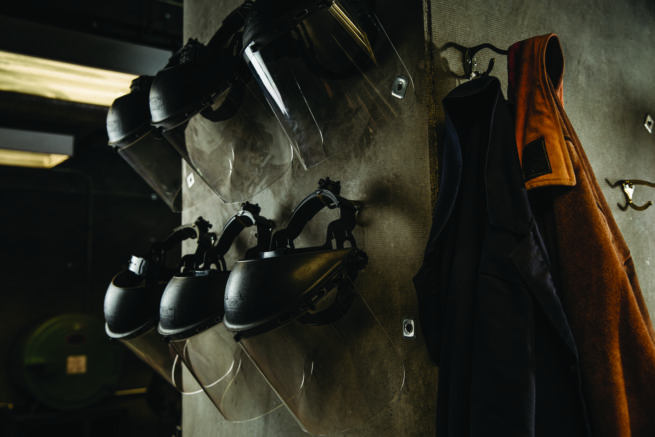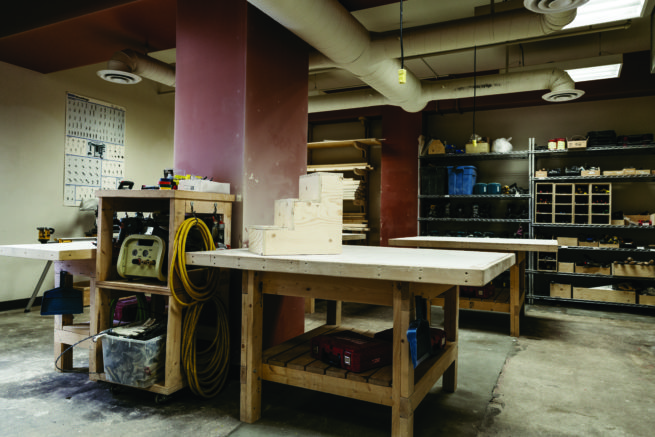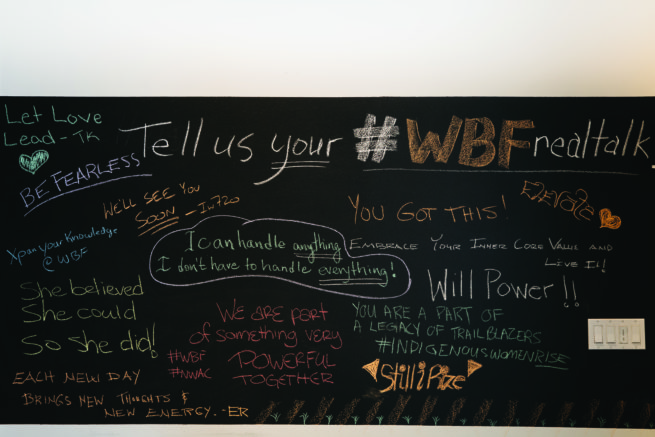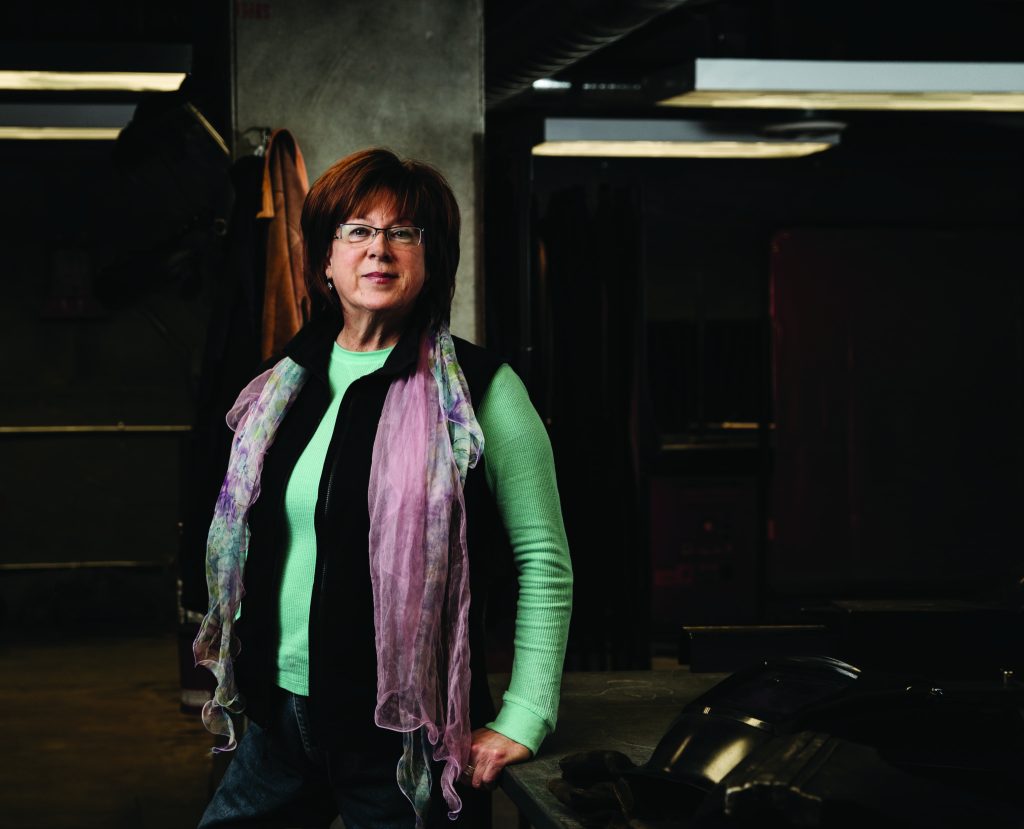A new endowment fund is JudyLynn Archer’s latest contribution to her life’s passion – Women Building Futures
If you want something, it’s up to you to make it happen.”
For 13 years, that philosophy shaped JudyLynn Archer’s vision as CEO and president of Women Building Futures (WBF), an organization dedicated to helping women find employment in careers where women are under-represented. It is also at the heart of the JudyLynn Archer Endowment Fund that she created at Edmonton Community Foundation (ECF) upon her retirement at the end of 2016, which will help cover tuition and housing costs in perpetuity for students in need. If women are provided with the tools to succeed, she believes, they will make it happen.
In conversation, Archer is warm, frank and passionate about WBF. There is also an inner strength that surfaces as she talks. Her grittiness was forged in the grinding poverty of her childhood.
“We were on welfare, we lived in low-rental housing…” Archer says. “I hated it. And I hated the way it made me feel.”
The desire to improve — first her own life and then the lives of others — has driven Archer forward for her entire adult life.
“JudyLynn is a force of nature,” says Kathy Kimpton, Archer’s successor at WBF.

While Archer’s career included stops in the trucking industry, library science and the public service, it was with WBF that she found her passion and a means to truly “pay it forward.”
Along the way, she has collected many accolades — the Women’s Executive Network Top 100 Most Powerful Women in Canada Award, a Global TV Woman of Vision Award, a NAIT Honorary Diploma in Construction Engineering Technology, the Alberta Apprenticeship & Industry Training Chairman’s Award of Excellence, to name only a few — and brought together women who were looking for better jobs with employers who were searching for skilled workers.
WBF, founded by a group of social workers in 1998, embraced a mission that was a mix of idealism and hard-headed reality. One aim, Archer says, was to “move the needle on poverty”— an aspiration that is easier to dream than achieve. Balancing it, though, was a clear-eyed assessment of the job market and the recognition of a void that WBF could help fill.
A shortage of qualified workers loomed in Alberta as a large segment of tradespeople neared retirement. WBF worked with a portion of the population that was under-represented in the construction industry: women. The solution was win-win — help women enter the trades, and help industry find the workers it required.
Archer, who began working with WBF in 2003, remembers the early years as spartan.
“We found a place on Jasper Avenue; it was just this little basement. It was actually just 4,000 square feet of concrete and one light bulb. We signed a three-year lease without having any idea how we were actually going to do anything: make the lease payments, build a training centre, anything like that. But we did.”
Through hard work, ingenuity and the generosity of supporters, the dream of WBF slowly became reality.
“We scrounged lumber, heat ducting, lights, ceiling tiles: everything,” Archer says. “We built this lovely — small — training centre with a tool crib and a classroom, just with tools and the women coming over who were interested in helping. During that three-year period, we began to really feel we were on to something.”
The small basement centre was eventually replaced, with assistance from many stakeholder partners, with the new WBF Housing Facility and Suncor Energy Training Centre on 107 Street in Edmonton that features training workshops, classrooms and 42 units of student housing, 18 of which are earmarked for mothers and their children. It was purchased in 2005, and officially opened in 2008.

Archer wasn’t the only one. Buy-in from industry and government partners followed.
“When we shared our vision with our stakeholders, they began to surround us one by one, year over year, until the dream was no longer WBF’s. It had become a shared vision.” Archer says.
WBF has certainly grown since those early days. In addition to the housing and training centre on 107 Street, its main administrative office is on 109 Street, in the former home of an architecture firm.
The main office is an open space, marked by soaring ceilings and dramatic use of brick and wood. It calls to mind possibilities and potential.
In the entranceway is a chalkboard covered in inspirational slogans and expressions of WBF’s ideals.
“You are part of a legacy of trailblazers. #indigenouswomenrise,” says one.
“Together we are part of something very powerful,” says another.
In a meeting room, Kimpton, the new CEO and president of WBF, talks about the past, present and future of the organization, and of her predecessor’s contributions. Kimpton is funny and self-deprecating, but speaks quickly, with energy and purpose. When Kimpton saw the opportunity with WBF, it resonated with her.
“I said to my husband, after reading the job description, ‘That makes my heart sing,’ ” Kimpton says. “And it’s because it is focused on women who are faced with barriers.”
The organization that Kimpton took on in 2017 has evolved dramatically from the one Archer came to in 2003.
The organization boasts strong relationships with stakeholder partners, an ever-increasing array of programs for its clients, and even a new office in Fort McMurray. It is well-established as a source of safe, skilled workers and works hard to be responsive to the needs of its students and industry.
What hasn’t changed is WBF’s dedication to helping women get into the program, regardless of their means.
“We do not want lack of money to hold someone back from realizing their dreams,” Archer says.
Kimpton echoes that statement, noting that the organization serves clientele who are often disadvantaged and may lack confidence or even hope.
“They get ‘no’ all over the place,” Kimpton says. “And they say ‘no’ to themselves.
It’s our job to find a way to say ‘yes.’”

A point of pride for WBF is the meaningful difference it has made in improving opportunities for Indigenous women. According to the latest figures, WBF is engaged with 48 Indigenous communities and 26 per cent of WBF graduates are Indigenous.
WBF can promote some impressive outcomes — 2,000 graduates to date; over 90 per cent employment rate for graduates and on average, depending on the trade, an increase in earnings ranging from 132 to 250 per cent.
In 2017, Archer cemented her ongoing commitment to WBF with the establishment of an endowment fund created at Edmonton Community Foundation. Archer’s $100,000 personal donation was matched by North West Refining and Canadian Natural Resources Limited. Archer says she plans to grow the fund for the next five years to help support students with tuition and housing costs.
She says the fund “is a way of acknowledging all the individuals who share our dream and continue to walk hand-in-hand with us to achieve it.”
Presently, WBF continues its mission, giving women choice and opportunity for a more prosperous future. Their national awareness campaign “You Got This,” and hints at future expansion indicate that the momentum established under Archer’s leadership is being maintained.
Kimpton says that Archer’s legacy to WBF runs much deeper than the endowment fund that bears her name.
“JudyLynn’s real legacy is her impact, which is changing the face of the construction industry.”
Among the slogans on the board at the entrance of the WBF office is a phrase that captures the spirit of WBF, but could just as well have been written about JudyLynn Archer personally.
“She believed she could,” it reads. “So she did.”
Listen to ECF’s interview with JudyLynn Archer and Kathy Kimpton on The Well-Endowed Podcast.
